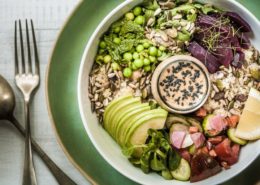The best nutrients for fertility and pregnancy
Your body needs different nutrition for IVF. While the food and drink you require will differ on an individual basis, some things are essentials no matter who you are.
Our fertility nutritionists will look at your current nutritional intake and advise you on what you need more, and less of. This will include the following:
Folic acid
Folic acid helps develop a baby’s neural tube, which becomes part of the spine and brain. A lack of this vitamin can prevent proper growth, leading to potential problems with your baby’s development. Adding this to your diet before conception can significantly improve the chances of a healthy birth.
You’ll find folic acid in vegetables like asparagus, broccoli, cauliflower, spinach and bok choy, while lentils are also full of it.
Zinc
Zinc is great for regulating hormones during your menstrual cycle, and it also helps eggs mature. In men, zinc can boost the amount, quality and performance of sperm.
Zinc is abundant in beef, lamb, sesame seeds, pumpkin seeds, asparagus, lentils and quinoa.
Vitamin C
This antioxidant is a wonderful addition to a male’s diet. It can improve his sperm quality and increase his ejaculate volume, giving you a better chance of success.
You’ll find Vitamin C in papaya, peppers, broccoli, strawberries, pineapple, kale, cauliflower and cabbage.
Omega 3
Omega 3 will help balance your hormones, increase cervical mucus and improve blood flow to your uterus, all creating a healthy environment for your child to develop in.
You can find lots of Omega 3 in things like walnuts, salmon, sardines, chia seeds and mackerel.
Beta-carotene
Remember being told carrots would let you see in the dark? Well, they won’t, but the thing that led to the rumour is called Beta-carotene, and it gives fruit and vegetables their bright colours. It can also boost fertility levels in both men and women (both at day and night).
Find it in sweet potato, carrots, dark green leafy vegetables, squash and red peppers.
Vitamin E
This antioxidant has been proven to help increase your fertility, while in men it can enhance sperm health. A great combination to add to your diet.
Find Vitamin E in sunflower seeds, spinach, asparagus, almonds, broccoli, kale and avocado.
Selenium
Selenium is a helpful antioxidant that can help prevent chromosome breakage, allowing eggs to form more easily. It’s also an essential ingredient for sperm formation.
You’ll find selenium in Brazil nuts, salmon, asparagus, turkey, chicken and eggs.
L-Arginine
Another one great for men, this amino acid can help improve blood flow to the penis, allowing a man to maintain an erection.
You can find it in turkey, pork, pumpkin seeds, peanuts, chickpeas and lentils.
L-Carnitine
Another amino acid which boosts testosterone levels, this can help with sperm mobility and health.
It’s found in things like beef, pork, cod, chicken, asparagus and avocado.


